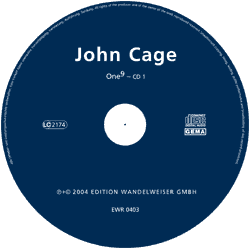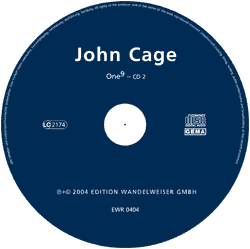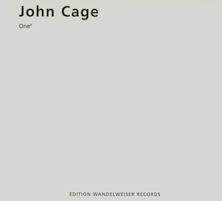EDITION WANDELWEISER RECORDS
> CD catalogue
_____________________________________________________________________
<< >>
John Cage
One9
| order
reference:
medium: composer: performer: |
EWR
0403/04 CD John Cage Edwin Alexander Buchholz, accordion |
 |
 |
 |
> Rezension Stefan Drees (Positionen 63) (german)
|
“sounds brushed into existence as in oriental calligraphy" (Cage) the sounds in one9 are single tones and chords, up to six part harmonies. how do sounds come into existence, how do they gain focus, how do they resolve, how do they merge into one another, how can one quietly and attentively, in all modesty, follow their unfolding? these are the questions that guided edwin alexander buchholz in his interpretation of the piece. over the years he played one9 time and again - for himself and in concerts. gradually solutions manifested themselves which he never, at first, would have considered. it is not simply the case, that this music, which was originally written for shô, the japanese mouth organ from gagaku music, may also be played on accordion. much as the immemorial shô, originated about 4000 years ago, and the modern accordion are related, they are not interchangeable. one9 has been written specifically for shô and first has to find its way to the accordion, in order to become real accordion music. the accordion is a wind instrument, but also a keyboard instrument, it has stops, its colours are eminently rich and its two sound sources, as long as they are sounding, are always moving: away from each other, towards each other. for edwin alexander buchholz one9, in the course of time, grew into a music, that integrated all of this, a music entirely for his instrument: the accordion. traditionally the sound of the shô is connected to the heavens' gleam. I have no trouble hearing this quality here, in the sound of the accordion. antoine beuger > top (...) Fast wie ein Gegenstück zu dieser Produktion wirkt eine neue, in Zusammenarbeit mit Radio Bremen entstandene CD der Edition Wandelweiser, bei der sich der Akkordeonist Edwin Alexander Buchholz mit großem Engagement der Komposition one9 (1991) von John Cage angenommen hat. Die Übertragung des ursprünglich für Sho konzipierten Werkes auf das Akkordeon besticht durch behutsam den Möglichkeiten des anderen instrumentalen Mediums angepasste Schattierungen verschiedener Klangregister, die dem Werk eine neue, sehr individuelle Farbigkeit verleihen. Buchholz bringt dabei die Vorzüge und Möglichkeiten des Akkordeons optimal zur Geltung: Die Klänge atmen förmlich, sind mit einer enormen Lebendigkeit gestaltet, die jeweils neu und in zahlreichen dynamischen Schattierungen aus der Stille aufblühen. Ihr allmähliches Verlöschen, kurzes Aufleuchten oder rasches Abbrechen färbt die dazwischen liegenden Pausen immer anders, macht die Stille unterschiedlich erlebbar. Buchholz hat damit nicht nur eine überzeugende eigene Version von Cages Werk vorgelegt, er vermag dem Stück auch viele Nuancen zu verleihen, die es in seiner ursprünglichen Version nicht hat. Stefan Drees (Positionen 63) > top |